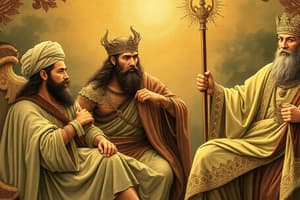Podcast
Questions and Answers
According to Huntington, what is the fundamental difference between modern and traditional societies?
According to Huntington, what is the fundamental difference between modern and traditional societies?
- Modern societies have less control over their natural and social environment due to the accumulation of traditional knowledge.
- Modern societies have no control over their natural and social environment, while traditional societies have complete control.
- Modern societies have greater control over their natural and social environment due to the expansion of scientific and technological knowledge. (correct)
- There is no fundamental difference between modern and traditional societies in terms of control over their environment.
Which of the following statements best describes the intellectual characteristics of modern societies, according to Huntington?
Which of the following statements best describes the intellectual characteristics of modern societies, according to Huntington?
- Modern societies are characterized by a tremendous accumulation of knowledge about the environment and the diffusion of this knowledge through education and mass communication. (correct)
- Modern societies place no emphasis on education or mass communication.
- Modern societies prioritize traditional knowledge over scientific and technological knowledge.
- Modern societies are characterized by a lack of knowledge about the environment and limited diffusion of this knowledge.
Which of the following statements is true about the demographic and economic characteristics of modern societies, as described by Huntington?
Which of the following statements is true about the demographic and economic characteristics of modern societies, as described by Huntington?
- Modern societies have no significant differences in demographic or economic characteristics compared to traditional societies.
- Modern societies have lower life expectancy, poorer health, and limited occupational and geographical mobility compared to traditional societies.
- Modern societies have better health, longer life expectancy, higher rates of occupational and geographical mobility, are predominantly urban, and have diverse economic activities beyond agriculture. (correct)
- Modern societies are predominantly rural, with a focus on subsistence agriculture and a few simple occupations.
What does Huntington suggest about the scope of economic activity in modern societies compared to traditional societies?
What does Huntington suggest about the scope of economic activity in modern societies compared to traditional societies?
According to Huntington's theory, what is the process of modernization?
According to Huntington's theory, what is the process of modernization?
Based on Huntington's description, which of the following statements best characterizes traditional societies?
Based on Huntington's description, which of the following statements best characterizes traditional societies?
Which of the following is not considered a component of the modernization process according to the text?
Which of the following is not considered a component of the modernization process according to the text?
What does the text suggest about the relationship between changes in different factors during the modernization process?
What does the text suggest about the relationship between changes in different factors during the modernization process?
What is the primary way in which modernization has become a global process?
What is the primary way in which modernization has become a global process?
What does the text suggest about the relationship between the revolutionary and evolutionary nature of the modernization process?
What does the text suggest about the relationship between the revolutionary and evolutionary nature of the modernization process?
What does the text suggest about the homogenizing effect of modernization on different societies?
What does the text suggest about the homogenizing effect of modernization on different societies?
What does the text suggest about the reversibility of the modernization process?
What does the text suggest about the reversibility of the modernization process?
Study Notes
Fundamental Differences Between Societies
- Modern societies are characterized by dynamic change, rationality, and individualism, unlike traditional societies which exhibit stability, collectivism, and adherence to customs.
Intellectual Characteristics of Modern Societies
- Intellectual life in modern societies is marked by critical thinking, scientific reasoning, and an emphasis on innovation and progress.
Demographic and Economic Characteristics of Modern Societies
- Modern societies typically experience urbanization, increased mobility, and a diverse economy that shifts from agriculture to industry and services.
Economic Activity Scope
- Economic activity in modern societies is broader and more integrated into global markets, in contrast to the limited and local nature of traditional economies.
Process of Modernization
- Modernization involves the transformation of social, economic, and political structures, promoting technological advancement and changes in social values.
Characterization of Traditional Societies
- Traditional societies tend to be agrarian, community-oriented, and resistant to change, relying heavily on established norms and values.
Components of Modernization Process
- Components like technological advancement, institutional development, and educational improvements are integral to modernization; however, cultural homogeneity is not typically emphasized.
Interrelationship of Changes During Modernization
- Changes in social, economic, and political spheres are interrelated; progress in one area often spurs developments in others.
Global Nature of Modernization
- Modernization has become a global process through the spread of technology, communication networks, and international trade, transcending local boundaries.
Nature of Modernization Process
- The modernization process exhibits both revolutionary and evolutionary traits, combining rapid changes with gradual adaptations over time.
Homogenizing Effect of Modernization
- Modernization tends to create cultural similarities across societies, leading to a diminished distinction between different cultural practices and norms.
Reversibility of Modernization Process
- The modernization process is generally viewed as irreversible, although certain societies may experience setbacks or regressions due to political or economic crises.
Studying That Suits You
Use AI to generate personalized quizzes and flashcards to suit your learning preferences.
Description
Explore the key aspects of Samuel Huntington's Political Modernization and Development Theory, which involves comparing modern and traditional societies based on their control over the natural and social environment. Understand the role of scientific and technological knowledge in shaping modern societies.





